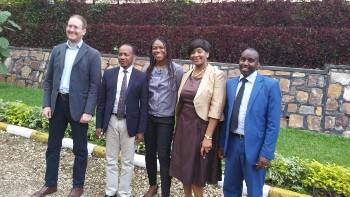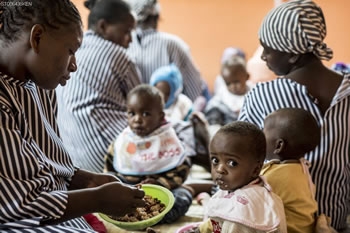Strengthening the Legal Case for Universal Health Coverage

A4ID partner, International Alliance of Patients’ Organizations, establishes team of elite patient advocates to promote global universal health coverage.
The International Alliance of Patients’ Organizations, assisted by lawyers from A4ID’s Legal Partner Dechert LLP, undertook an analysis of healthcare governance and the legal framework applicable to universal health coverage to support the establishment of a group of patient advocates who will seek to bring about universal health coverage in their respective countries.
Achieving Universal Health Coverage By 2030
Universal health coverage, including financial risk protection, access to quality, essential healthcare services and access to safe, effective, quality and affordable essential medicines and vaccines for all, is an explicit target under the UN’s Sustainable Development Goal (SDG) 3 to ensure healthy lives and promote well-being for all. Presently, however, fewer than 70 countries have true universal health coverage. It is the view of the International Alliance of Patients’ Organizations that unless UN Member States are held legally accountable for taking steps towards achieving universal health coverage, with particular focus on making the right to health a legally binding principle of domestic law, SDG 3 will not be achieved in time to meet the 2030 deadline. The organisation believes that a strategic leveraging of international and domestic law and human rights is necessary to advance universal health coverage.
The International Alliance of Patients’ Organizations is an alliance of patient groups who champion the rights, and represent the interests, of patients worldwide. Comprised of 250 member organisations in over 65 countries, covering 60 different medical conditions, the International Alliance of Patients’ Organizations’ work is focused primarily on low and middle-income countries. Through its network of member organisations, the International Alliance of Patients’ Organizations nurtures relationships with all those involved in the medical sector and seeks to create a dialogue with decision-makers and other stakeholders around the world to promote patient-centred healthcare.
Empowering Local Patient Advocates
True universal health coverage is characterised by a healthcare system in which all patients, irrespective of means, can access the promotional, preventive, curative, rehabilitative and palliative health services they need. Healthcare services should be of sufficient quality to be effective, while also ensuring that use of these services does not expose the patient to financial hardship. By developing capacity among both legal and healthcare patient advocates, the International Alliance of Patients’ Organizations seeks to support a progressive realisation of the right to health, through the monitoring and benchmarking of state performance against precise indicators and targets. Where necessary, the organisation seeks to challenge a states’ failure to meet targets in national courts, using existing domestic legislation.
The International Alliance of Patients’ Organizations approached A4ID for assistance in researching the legal obligations on governments, arising in international and national law, to provide universal health coverage and assessing how these obligations are sufficient to attain SDG Target 3.8 to provide access to quality, essential healthcare for all. The International Alliance of Patients’ Organizations sought clarification of universal health coverage’s status as a fundamental human right as developed under international conventions and treaties, as well as instruments of national law. The organisation wanted to focus on the right to universal health coverage as it applies to vulnerable patient groups like children, those with disabilities, women and minority ethnic and indigenous communities.
A4ID connected the International Alliance of Patients’ Organizations with its Legal Partner and global law firm, Dechert LLP, who worked with the organisation to provide an overview of the legal status of universal health coverage in several jurisdictions, focusing on Kenya as a test case. International Alliance of Patients’ Organizations CEO Kawaldip Sehmi praised the team from Dechert for their detailed and very useful advice; inspiring guidance on advocacy; and willingness to participate in the organisation’s African Regional Meeting in Entebbe, Uganda. The research will enable the International Alliance of Patients’ Organizations to establish a team of elite patient advocates to promote universal health coverage globally, who will be empowered to undertake local lobbying and, where necessary, commence legal proceedings against governments (in conjunction with local legal advocates) to further the implementation of universal health coverage by 2030.
The International Alliance of Patients’ Organizations’ African Regional Meeting in Entebbe, Uganda
Lawyers from Dechert attended the International Alliance of Patients’ Organizations’ African Regional Meeting in Entebbe, Uganda to provide training to current and future patient advocates, sharing insights from the research conducted as part of the project. The training provided was focused on available advocacy strategies, including negotiation with government healthcare authorities and the viability of enforcing the right to universal health coverage through litigation. In addition, Dechert provided advice concerning the strengths of local advocates as direct witnesses of the realities of healthcare provision, as well as those best placed to obtain and verify eyewitness accounts and build lasting partnerships with other stakeholders on the ground.
The Regional Meeting also featured a panel discussion covering the African Union’s recent announcement of the creation of the African Medicines Agency, which seeks to connect regional pharmaceutical regulation authorities throughout Africa and establish a harmonised regulatory regime for the continent.
A Window of Opportunity for Universal Health Coverage
The International Alliance of Patients’ Organizations’ work is focused directly on advancing UN SDG 3, and in particular, Target 3.8 to provide universal health coverage for all, by 2030. To reach true universal health coverage, the International Alliance of Patients’ Organizations believes that local patient advocates must establish and leverage three critical conditions:
- political engagement at legislative and governmental level
- increased media exposure and public support for universal health coverage as a policy goal
- international distribution of robust evidential support for the benefits of universal health coverage produced by respected bodies and academics
The organisation takes the view that these enabling conditions have been established at an international level, given:
- the inclusion of universal health coverage as a goal and target in the SDGs represents a high-level political commitment by UN Member States to work towards achieving universal health coverage
- universal health coverage as a policy goal is backed by substantial evidence from several high-profile health and economic development institutions including the World Bank and the World Health Organization
- the UN SDGs generally, and universal health coverage as a specific target, have received widespread media and public recognition
The research conducted by Dechert will empower local patient advocates to push for the implementation of policies furthering universal health coverage at a national level, as a means of capitalising on this window of opportunity for universal health coverage and with the hope that true universal health coverage will be attained by 2030.

